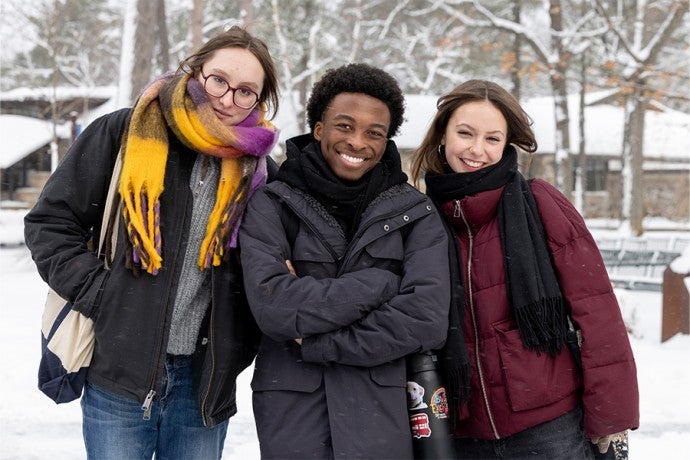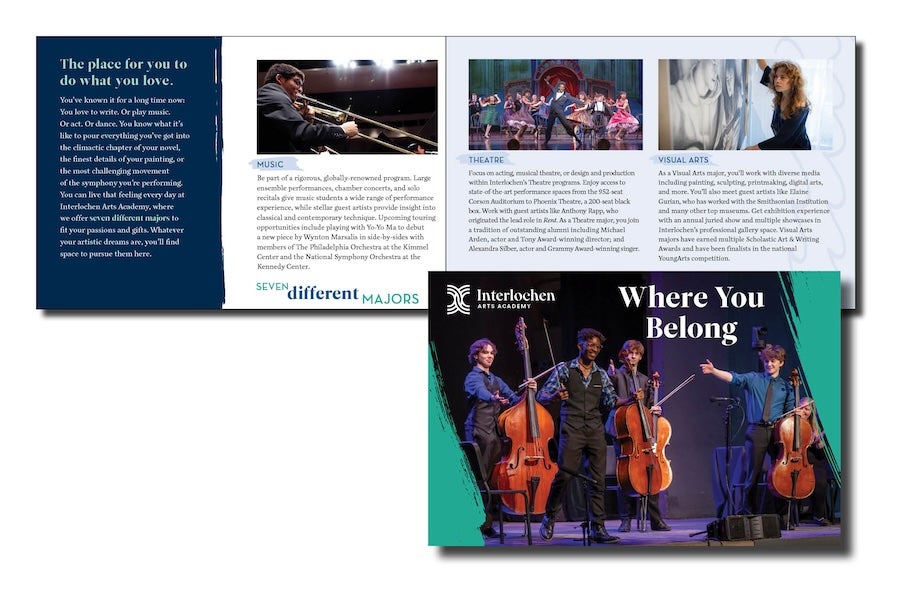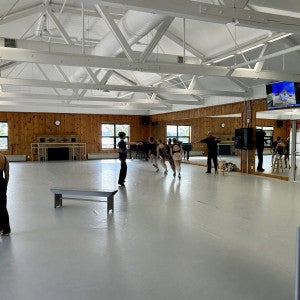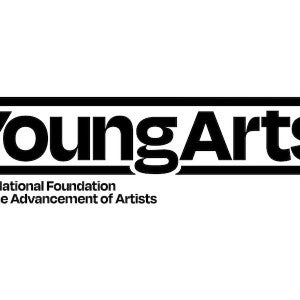Why do people go to boarding school?
From exceptional academics to diverse, tight-knit communities, here are some of the top reasons why students and their families choose this immersive educational option.

Three Interlochen Arts Academy students pause for a picture on a snowy day.
What do you think of when you hear the term “boarding school”? An elite academic institution for wealthy students? A place where parents send their troubled children? The setting of your favorite young adult fantasy novel?
While popular culture has painted a varied and sometimes mystical portrait of boarding school, thousands of real families from all socio-economic backgrounds choose to send their students to boarding schools every year. But what drives families to choose this distinctive educational path?
“Whether you want to focus on arts, athletics, or academics, boarding schools offer students a variety of advantages over traditional public or private schools,” says Dr. Camille Colatosti, Provost at Interlochen Arts Academy in Interlochen, Michigan. “These advantages include small class sizes, exceptional faculty, the fostering of lifelong friendships, the opportunity to develop independence, and the ability to specialize in a particular subject area.”
Below, we’ll explore some of the most common academic, personal, and practical factors behind this life-changing decision—and address some of the common concerns families may have about this immersive educational option.
7 reasons why students and families choose boarding schools
1. Academic excellence and specialized programs
Why do kids go to boarding school? One of the primary reasons families choose boarding schools is the pursuit of academic excellence. Many boarding schools offer rigorous curricula that surpass those available in local public or private day schools. These institutions often feature smaller class sizes, allowing for more personalized attention from teachers who hold advanced degrees in their subject areas. International Baccalaureate programs, Advanced Placement courses, and dual-enrollment programs such as Indiana University’s Advance College Project are commonplace in boarding school environments.
The academic intensity at boarding schools often extends beyond regular classroom hours. Study halls, tutoring sessions, and academic support systems create an environment where learning continues throughout the day. This structured approach helps students develop strong study habits and time management skills that prove invaluable in college and beyond.
Some boarding schools specialize in specific academic or extracurricular areas. Students passionate about science or mathematics can enroll at STEM-focused schools, which offer access to state-of-the-art laboratories and research opportunities typically reserved for college students. Young creatives might choose an arts boarding school, where they’ll find professional-grade studios, theatres, and music facilities—plus daily classes with expert artist-educators and regular master classes with world-class guests.
2. Independence and personal growth
Boarding school serves as a bridge between the protected environment of home and the independence of adulthood. Students learn to manage their daily routines, from waking up on time to doing laundry and maintaining their living spaces. This gradual assumption of responsibility builds confidence and self-reliance in ways that commuting to day school cannot replicate.
The residential experience forces students to navigate social situations independently, resolve conflicts without immediate parental intervention, and make decisions about their time and priorities. These experiences accelerate emotional maturity and prepare students for the independence required in college and professional life.
“I knew that going to a boarding school would help prepare me for my future by teaching me how to be independent and how to take care of myself,” says Grace O., a recent Arts Academy graduate. “The things that pushed me to become a boarding student were the opportunities that I could take advantage of during the evenings and the knowledge that I was going to be able to learn things about myself from being put in a college-like situation as a teenager.”
Another recent Academy graduate, Ari H., agrees. “The boarding experience at Interlochen definitely prepares you for the future—wherever that may be,” he says. “Regardless of where you end up after Interlochen, the skills of communication, collaboration, and time management are definitely helpful.” Living away from home also encourages students to discover their authentic selves, free from established family dynamics and hometown social expectations. Many boarding school graduates report that the experience helped them identify their genuine interests, values, and aspirations without external pressure from familiar social circles. These factors are important to consider if you’re asking “why boarding school?”
3. Diverse community and global perspectives
Boarding schools attract students from around the world, creating uniquely diverse learning communities. Students are exposed to different cultures, languages, and worldviews in their daily interactions, dining halls, and dormitory conversations. This multicultural environment prepares students for an increasingly globalized world and helps develop cultural sensitivity and adaptability.
“At a culturally-diverse boarding school, learning how students from other countries think and live their lives can be an education in itself,” Colatosti says.
The diversity extends beyond international representation to include students from various socioeconomic backgrounds, geographic regions, religions, and life experiences. Many boarding schools offer substantial financial aid programs, ensuring that talented students can attend regardless of their family's economic circumstances. This socioeconomic diversity enriches classroom discussions and broadens students' understanding of different life perspectives.
“I decided to enroll at Interlochen as a freshman because I really felt the need to get out of my small town and experience something else,” says Jasmine S., a recent Arts Academy graduate. “I love the diversity of the community—not only in race and religion, but also in experiences and backgrounds.”
So why go to boarding school? Students emerge from the experience with a truly multicultural education, leading to broader horizons and more ease in interacting with people from all walks of life.
4. Lifelong friendships
If you are researching questions like “why is boarding school better than day school,” this is one of the main factors. The unique structure of boarding school—with students both learning and living on their school’s campus—fosters a tight-knit community. Enrollment is limited by the amount of space available in residence halls; as a result, most boarding schools maintain comparatively small student bodies, ranging from a few dozen to a few hundred students.
Boarding school students are able to spend time with friends both inside and outside the classroom; this around-the-clock access to their peers enables students to forge stronger friendships than those developed at a traditional high school.
“The thing I like best about attending Interlochen is the friendships I've made here,” Grace says. “While most people your age are still living at home with their parents, you’re learning and growing alongside your friends during one of the most influential and important stages of your life. These people become your family.”
5. Extracurricular opportunities and leadership development
The residential nature of boarding schools allows for extensive extracurricular programs that would be impossible in day school settings. Students can participate in activities that extend well into the evening, from theatre productions and debate tournaments to robotics competitions and community service projects. Leadership opportunities abound in boarding school environments. Students serve as dormitory proctors, student council members, club presidents, team captains, and peer mentors. The school community relies on student leadership in ways that day schools often cannot, providing authentic opportunities to develop management and organizational skills.
Athletics programs at boarding schools are often exceptional, with facilities and coaching that rival some college programs. Students can pursue sports year-round and often have access to sports that might not be available in their home communities, from crew and squash to ice hockey and equestrian activities.
Some boarding schools specialize in particular extracurricular areas—such as sports or the arts. At Interlochen Arts Academy, for example, students spend four or more hours per day immersed in one of seven artistic disciplines under the guidance of acclaimed faculty. This rigorous pre-professional training prepares students to matriculate to top arts colleges and conservatories—such as The Juilliard School, Parsons School of Design, and the Ailey/Fordham BFA Program—and in some cases, to immediately pursue their art professionally. The school offers students access to world-class facilities and equipment, plus regional and national touring opportunities, collaborative projects, and other one-of-a-kind experiences.
“Coming from a small city in Virginia, I had little to no opportunities to perform on stage,” Ari says. “At Interlochen, I get coachings and lessons in chamber music, orchestral playing, and other topics from some of the best teachers you can find at the high school level.”
6. College preparation and alumni networks
A smooth transition to college and beyond is one of the best answers to the question “why choose boarding school?” Boarding schools typically have outstanding college counseling programs with dedicated staff who maintain relationships with admissions officers at top universities. The counselor-to-student ratios are often much more favorable than at day schools, allowing for personalized guidance throughout the college application process.
College counselors at specialized schools have years of experience helping students apply to top colleges in the school’s focus area—a major advantage for students hoping to pursue their passion for art, athletics, or other specialties at the college level.
“We work closely with our students both academically and artistically based on their individual trajectory," says Chad Gapinski, director of academic and college counseling at Interlochen Arts Academy. "We also collaborate with arts faculty to ensure a unified approach with our students' post-secondary plans. Having access to academic and college counselors focused on the arts helps set students up for success beyond high school."
Choosing to attend a boarding school also speaks volumes for a student’s character and college readiness—which can help students stand out in a competitive field of applicants.
“When admissions officers see a high-quality boarding school on your high school transcript, they can tell you’ve done something to set yourself apart,” Colatosti says. “Choosing a boarding school demonstrates your commitment to pursuing more challenging academics. It also shows the kind of personal and social maturity that admissions officers are often looking for.”
The alumni networks associated with established boarding schools can be powerful assets throughout students' lives. These connections often extend into professional fields, providing mentorship opportunities and career advantages that can last decades beyond graduation.
7. Family circumstances and practical considerations
Some families choose boarding school due to practical circumstances rather than purely educational reasons. Military families, diplomats, and international business executives may select boarding schools to provide educational stability when frequent relocations would otherwise disrupt their children's schooling.
Single parents or families facing challenging home situations sometimes view boarding school as providing a structured, supportive environment. This can be a thoughtful decision to ensure children receive consistent guidance and supervision.
Addressing common concerns about boarding school
Adjusting to life away from home
The emotional impact of separation is one of the most commonly cited concerns among prospective boarding school parents. However, modern boarding schools prioritize student well-being with comprehensive support systems including counselors, advisors, and pastoral care programs. Technology also makes staying connected with family easier than ever before.
At Interlochen Arts Academy, students have a robust support system to help them make the transition to boarding school life. Students are supervised around-the-clock by Instructors of Residence Life and other dormitory staff, who ensure students have returned to their residence hall by check-in time, lead sessions on basic life skills—such as doing laundry—and help students navigate conflicts with their roommates. Other resources include school counselors, academic support programs, and the school’s social-emotional learning program, The Interlochen 5.
“The counselors are extremely helpful,” says recent Interlochen Arts Academy graduate Lukas. “I found that Dr. [Michael] Kern was a great person to talk to during my freshman year, but all the counselors—and your Instructors of Residence Life—are also there to help. Most of your friends are probably experiencing homesickness as well, so you can support each other in that time.”
Cost of attendance
As a result of the high academic standards and residential component, boarding schools are often more expensive than private day schools. However, many schools offer generous financial aid packages to ensure that highly qualified students from all economic backgrounds are able to attend.
Families should consider the long-term investment in their child's education and future opportunities when evaluating the expense. Boarding school students often receive larger college scholarship awards when compared to their public-school peers. This is especially true at specialized schools, where the advanced training and college preparation students receive make them attractive applicants at top institutions.
Making the right choice
Ultimately, the decision to attend boarding school should align with a student's personality, goals, and family values. Independent, curious students who thrive in structured environments often flourish at boarding school, while others may benefit more from staying close to home and family support systems.
Prospective families should visit multiple schools, speak with current students and parents, and carefully consider whether the boarding school experience matches their educational priorities and personal circumstances.
Frequently asked questions (FAQs) about boarding school
Why do people have to go to boarding school? People don't "have to" go to boarding school; it's a choice families make together. Students choose boarding school to pursue academic excellence, access specialized programs in areas like arts or athletics, develop independence, experience diverse communities, or maintain educational stability during frequent family relocations. The decision is based on a student's goals and interests rather than obligation.
What is the purpose of boarding schools? The purpose of boarding schools is to provide immersive educational experiences that combine rigorous academics with character development and personal growth. Boarding schools create supportive communities where students receive personalized attention from expert faculty, develop independence and life skills, build meaningful friendships, and prepare for success in college and beyond.
Is boarding school for troubled kids? No, this is a misconception. While some specialized therapeutic boarding schools do help students with behavioral or emotional challenges, the vast majority of boarding schools serve academically motivated students seeking excellence and growth. Most families choose boarding schools for their strong academic programs, specialized offerings, diverse communities, exceptional facilities, and college preparation—not for disciplinary reasons.
What is the #1 boarding school in the US? Rankings vary depending on criteria, and the "best" school depends on individual student needs. Schools like Phillips Academy Andover, Phillips Exeter Academy, and The Lawrenceville School frequently rank highly across the board. For more specialized programs, Niche.com named Interlochen Arts Academy the #1 Best High School for the Arts in America, while schools like IMG Academy excel in athletics. The right boarding school is the one that best matches a student's particular interests, goals, and learning style rather than simply the highest-ranked option.
Conclusion
People choose boarding schools for a combination of academic, personal development, community, and practical considerations. The residential education experience offers unique advantages in preparing students for college and adult life, though it's not the right choice for every family. When the fit is appropriate, boarding school can provide transformative educational experiences that shape students' characters and open doors to future opportunities.
The key lies in understanding that boarding school is not simply about academic achievement, but about comprehensive personal development in a supportive, challenging environment that prepares young people for success in an interconnected world.
Dive deeper into Interlochen Arts Academy with a free digital viewbook






